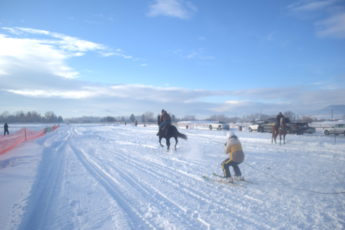Throughout the next month, join us at Prairie Populist as we highlight some of the people from Montana’s history that embodied the values of freedom, independence, and resilience. Click HERE to browse this series.
America’s First Female Representative Stood Her Ground For Women and Butte
Our Treasure State is famous for many things: beautiful scenery, blue-ribbon fishing streams, farming and ranching, and majestic mountains. But, did you know that Montana is also the birthplace of the country’s first female U.S. Representative? Montanans elected Jeannette Rankin to the U.S. House of Representatives in 1916, and again in 1940. Today, she remains the only woman elected to Congress from Montana.
When Rankin was sworn into office in April 2, 1917, she made national history and became a symbol of the intense, strong will that Montanans are known for today.
A voice of the people
Born near Missoula in 1880, back when Montana was still a territory, Rankin was the daughter of a rancher and a schoolteacher. Her parents’ influence, the nature of Big Sky Country, and the frontier of the American West all played factors in Rankin’s unparalleled grit and tenacity. She was a strong woman of the West, to say the least — refined but resolute. Her fierce independence served her well as the only woman in the legislature.
Rankin had strong opinions on many topics, including labor, war, and women’s suffrage. She was known for being practical in her approach to promoting the well-being of Montanans and all Americans alike. Her pragmatism inspired other Montanans to think reasonably about how best to care for our lands, water, and fellow Montanans.
Before she was elected to Congress, Rankin had an influential voice in the women’s suffrage movement. In 1911, she was the first person to speak in front of the Montana state legislature about the issue. When the Montana State Legislature granted women the right the vote three years later, Rankin was credited as being a driving force behind the decision.
Her reputation as a pragmatist followed her to Washington, D.C.
“There is the weight of thought and logic in her words,” noted The Boston Globe, after one of her first appearances as a congresswoman in 1917.
Getty Images
Refusing to conform
Whether stemming from her role as the only woman in the legislature or from her frontier upbringing, Rankin was known for making nonconformist decisions, an approach many Montanans are are known for even today.
Rankin gained international attention for her pacifist attitude toward both World Wars. She voted “no” on the declaration of war against Germany. Later, she was the sole U.S. Representative to oppose the declaration of war against Japan in response to the attack on Pearl Harbor.
Using influence on Capitol Hill to support workers at home
A staunch supporter of Montana’s miners, especially those who worked in the depths of the earth beneath Butte, Rankin not only cared for these hard-working men, but was also well aware of the emotional toll mining put upon their families. In Congress, she worked to use her legislative influence to improve conditions for all of them.
During Rankin’s first year in office, 168 men died in the the Speculator Mine disaster. Soon after, the miners went on strike. Addressing 15,000 miners in a packed baseball stadium in Butte, Rankin condemned the dominant Anaconda Copper Mining Company for its working conditions and attempts to suppress protests by the miners.
“Miss Jeannette Rankin is a friend of the striking miners,” The Washington Times reported.
As the strike wore on, the lynching of Industrial Workers of the World (IWW) organizer Frank Little sent the angry miners into an absolute rage. When the federal government sent troops to Butte to keep the protesters in line, Rankin stepped in even further. Citing the troops as an inappropriate use of federal authority, she appeared before the U.S. House Committee on Mines and Mining to propose a bill (H.J. Res 142) that would give the President the power to take control of metal mines in the U.S. By removing power from the mining company she hoped to see justice restored for the miners in Butte and their families.
Federal troops protecting mine entrance in Butte. Courtesy of Butte Archives
Rankin publicly spoke out against the rustling card system, which mining companies used to fire miners who attempted to organize against unfair policies. She labeled this a form of blackmail, since it suppressed necessary assembly. She called out the unsafe working conditions in the the shafts thousands of feet below the surface, noting that miners’ wives, “Fear every time their husbands go to work they never will return.” And she fought for higher wages, understanding it was nearly impossible to survive on a miner’s wage in Butte. Although Rankin’s bill never made it out of Committee, and Congress continued to use troops to handle the mess, she became an icon for Montana miners and their families.
Perhaps the most important takeaway of Rankin’s time as our representative was her role in building a national image of Montanans as independent, resilient people who think practically and care about their land and their neighbors — an image that persists today.
~Brooke Reynolds
To learn more about Jeannette Rankin and her contributions to Montana, check out these resources.
https://history.house.gov/Blog/2017/May/5-16-Rankin-Industry/
https://history.house.gov/Blog/Detail/15032449663
Got something to say to Prairie Populist? Send news tips, story ideas and comments to [email protected]. If you have something to submit, or an idea for a story you’d like to write for us, check out our Submission Guidelines here.

